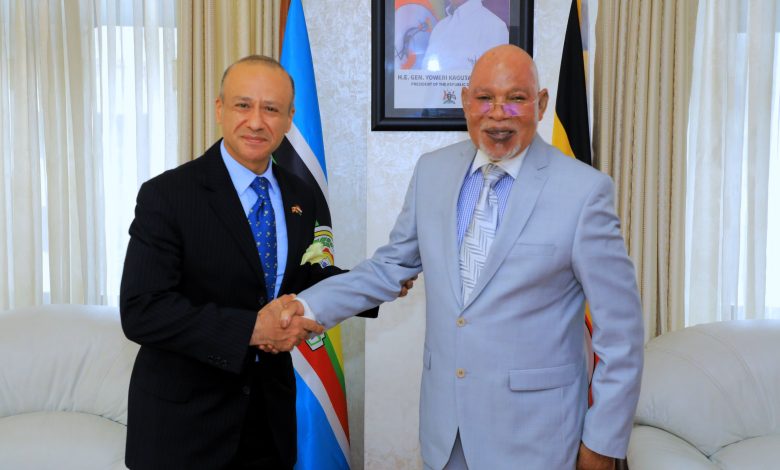Egyptian Ambassador To Uganda Praises Uganda For It’s Investment Potential

The Egyptian Ambassador to Uganda H.E. Mr. Monzer Selim has praised Uganda because of it’s potential in investment.
During his talk to Kampala Now, he said that Egyptian and Arab private sectors should start studying the Ugandan markets seriously, and explore ways to benefit from the opportunities they provide to create joint dealings.
Enjoy the full conversation;
Do you think Uganda has a good investment environment?
Uganda has excellent investment potential in various fields. I believe that the Egyptian and Arab private sectors should start studying the Ugandan markets seriously, and explore ways to benefit from the opportunities they provide to create joint dealings. Such as the fields of agriculture, energy, and even oil with the recent discoveries. This requires the private sector to be serious about this goal, and to create a bridge of communication with the Ugandan private sector and the Ugandan government to understand the nature of the investment field.
Tell us about the form of cooperation between Egypt and Uganda?
President Museveni is a leader who enjoys great wisdom and prudence, in his assessment of the situation, and he always values relations with sister African countries, as he always emphasizes in his statements the importance of African solidarity, and thus bilateral relations between Egypt and Uganda in particular and Africa in general, are based on the principle of African solidarity.
He always initiates any step or move that works to enhance cooperation between African countries.
How do you see the future of relations between the two countries?
What we are looking forward to in the future is to enhance cooperation between Egypt and Uganda in new fields, and on this basis we found that the first step to achieve this is to find the appropriate forum for the private sectors (Egyptian) Ugandan). The beginning of this step is the economic conference.
We rely on finding the interests of the Ugandan private sector and the interests of the private sector by creating communication channels, based on the results of accurate feasibility studies to determine priorities. Accordingly, we can consider forming an Egyptian-Ugandan Business Council, and this step will be, God willing, in the future supported by consultation between Egyptian trade and industrial federations and Egyptian chambers of commerce with their counterparts in Uganda.
In addition to the fact that communication is already in place, the economic and trade exhibitions hosted by Egypt annually are a golden opportunity for communication between representatives of the private sector in various economic and industrial fields. The participation of Ugandan companies in these events in Cairo opens new horizons for joint cooperation, and these participations have resulted in fruitful communication between the Egyptian and Ugandan private sectors, especially in the energy sector.
Is this the first of its kind or have there been previous exhibitions?
Before this exhibition, we had exhibitions in the energy field, which resulted in communication in the energy field between Uganda and Egypt, climate feasibility studies and studying the possibility of benefiting from Egyptian expertise in various fields that have become priorities in the international community.
Any investment project today must take into account the carbon impact and environmental sustainability.
The opportunity is now available for a group of Egyptian companies representing about sixteen sectors to meet with more than fifty to sixty representatives of Ugandan companies, to consult, discuss and explore investment opportunities and enhance trade exchange between the two countries. This is the current status of bilateral relations in terms of economy and trade.
What is your message to the Ugandan government?
Our message to the Ugandan government is to benefit from the successful Egyptian experiences in attracting foreign investments and enhancing trade exchange between the two countries. Meetings between representatives of the Egyptian and Ugandan private sectors, such as the trade and economic forum, are a start on the right path.
What are the challenges facing trade exchange between the two countries? How to remove these obstacles?
We have to find other ways to reduce the cost of trade, such as improving sea transport, which is the cheapest type of transport compared to air transport. The understanding with the Ministry of Finance and the Ministry of Trade of Uganda on removing customs obstacles will contribute to facilitating the access of Ugandan exports to Egypt.
What is the volume of trade exchange between the two countries?
The volume of trade exchange between Egypt and Uganda in 2022 amounted to about $100 million, and we must work to increase this volume by enhancing joint cooperation and exploiting available opportunities, and in 2023 it amounted to only $133 million. There are many opportunities that can be exploited, but these opportunities face some obstacles that must be overcome.
Tell us about the progress of agreements in the tourism sector?
During the visit of the Egyptian Minister of Foreign Affairs and the Minister of Tourism, it was agreed that Egypt and Uganda are two countries that complement each other in the field of tourism, without competition between them. The tourism product that Egypt offers in global markets is completely different from the tourism product offered by Uganda.
It was agreed to exploit this integration to offer joint tourism products, whether Egyptian or Ugandan, to attract foreign tourists. For example, archaeological tourism or beach tourism can be promoted as one of the other fields.
The Nile water issue is considered one of the pending regional issues. Is there any cooperation between you in this issue
Regarding cooperation in the field of water, we found a great welcome from the Ugandan side for this initiative. It is planned that there will be mutual ministerial visits to consult on how to activate this cooperation, which will also result in the economic forum.
In this field, relations between Egypt and Uganda have extended for nearly thirty years with a weed control agreement that is renewed every three years.
On the other hand, Egypt is working to enhance cooperation with the countries of the southern Nile Basin, by providing water. An initiative has been launched to establish a development fund with an initial capital of up to $100 million, with the aim of supporting the implementation of development projects in the countries of the southern Nile Basin, especially the countries bordering Lake Victoria and the main Great Lakes, such as Rwanda.
Tell us about the form of historical relations and investment opportunities?
The historical relations between Egypt and Uganda extend before Uganda’s independence, as Egypt hosted all the offices of African liberation movements, most of which were concentrated in the Zamalek area in downtown Cairo. Following Uganda’s independence, bilateral relations between the two countries began, with a focus on Egypt’s support for the process of political independence and social and economic development in Uganda, until the beginning of this century.
But when did Egypt start exploiting these relations with Uganda?
With the development of African economies, especially the Ugandan economy, and President Museveni’s keenness to strengthen bilateral relations, Egypt began studying the possibility of exploiting the positive economic and investment climate in Uganda. It also began working with Uganda to exploit existing opportunities, such as the two countries joining the COMESA group, which provides preferential trade treatment for products of national origin. This is one of the topics being discussed with the Ugandan side to enhance trade and economic cooperation, in addition to the existing investment cooperation. Egypt’s investments in Uganda include various fields such as contracting, food, medical and engineering industries, and are a successful model for achieving industrial integration between the two countries.
Although in its current state, it does not live up to the potential available in Uganda and Egypt. For example, trade exchange between the two countries is still limited despite the huge potential available. In Uganda, the potential for exporting agricultural products is very high, and in Egypt we have the potential to export many goods, whether manufactured or unmanufactured.
We are currently addressing these obstacles with the Ugandan side and discussing them at different levels with government representatives, starting with President Museveni and down to local ministers. The most important of these obstacles is the imposition of customs duties on goods imported from COMESA countries. We are currently working to reach an understanding with the Ministry of Finance and the Ministry of Trade to adhere to the agreement in a way that facilitates Egyptian imports and the access of Ugandan exports to Egypt.
The second point we are trying to address is the high cost of shipping. Uganda is a landlocked country, so any imports or exports have to go through a neighboring country like Kenya or Tanzania for sea transport, which is still the cheapest mode of transport. Air transport is available, but it is still quite expensive. Recently we have succeeded in providing air freight in Egypt, but the volume that can be transported by air is limited.
So this is a start on the right path, but we have to find another way to reduce the cost. What we are talking about now with the Ugandan private sector and the Egyptian private sector is that trade costs less when it increases in volume. If the two private sectors can reach agreements on large volumes, this will allow air transport companies to increase the volumes transported, which will reduce the cost.
There is an opportunity for a group of Egyptian companies representing about sixteen sectors to meet with more than fifty to sixty representatives of Ugandan companies, to consult, discuss and explore investment opportunities and enhance trade between the two countries. This is the current state of bilateral relations in terms of economy and trade.
Tell us about Egyptian investment in Uganda?
Uganda has great investment opportunities that the Egyptian sector is trying to exploit and has largely succeeded, as evidenced by the presence of 25 Egyptian companies registered in Uganda, with investments worth about $95 million, in various fields including food industries, pharmaceuticals, contracting, shipping, and others.
These opportunities could increase if the investment climate improves further, as Uganda still imposes high taxes on foreign companies, and if you want to transfer profits outside Uganda, it requires paying taxes of 25%. The enormous pressure has become a burden. This is one of the experiences in which Egypt has long experience that Uganda can benefit from to solve this burden.




